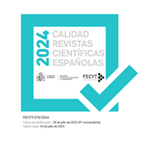Language strategies used by tourism degree students for learning German as a third language
Resumen
This study examines the perceptions of Tourism major students of strategies for learning German as their L3. Using questionnaires adopted from the Oxford (1990) Strategy Inventory of Language Learning (SILL), this research aims to answer the following questions: (1) What are the most and the least frequently used language learning strategies (LLSs) among learners of German as a third language? (2) Is it possible to identify differences between the strategies employed if the language is studied for a specific purpose (LSP) in the Tourism Degree Programme? If so, (3) which strategy is best adapted to this specific group? The results of this study show that (1) according to the analysis of the data from the SILL questionnaire, the students were medium user of strategies in learning German as their L3, and that metacognitive strategies (mean =3.55) were the most frequently used, while affective strategies (mean= 3.06) were the least frequently used. (2) The best LLS to choose will depend on the students’ needs, and German in the Tourism Bachelor focuses on communicative competence and interaction to facilitate more flexible, and above all more experimental, learner behaviour. (3) Social strategies are the ones that have been identified as the best for this specific group, because these LLSs help to improve students’ oral communication skills.Descargas
Descarga artículo
Licencia
La revista Círculo de Lingüística Aplicada a la Comunicación, para fomentar el intercambio global del conocimiento, facilita el acceso sin restricciones a sus contenidos desde el momento de su publicación en la presente edición electrónica, y por eso es una revista de acceso abierto. Los originales publicados en esta revista son propiedad de la Universidad Complutense de Madrid y es obligatorio citar su procedencia en cualquier reproducción total o parcial. Todos los contenidos se distribuyen bajo una licencia de uso y distribución Creative Commons Reconocimiento 4.0 (CC BY 4.0). Esta circunstancia ha de hacerse constar expresamente de esta forma cuando sea necesario. Puede consultar la versión informativa y el texto legal de la licencia.











